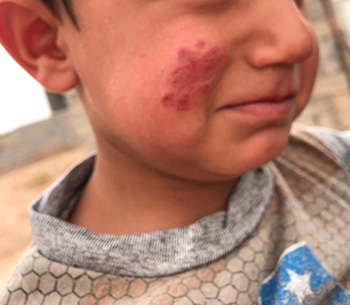17 September 2023, Baghdad, Iraq – Cutaneous leishmaniasis, known locally as the “Baghdad boil”, has overwhelmed many parts of Iraq for decades, posing a persistent threat to its people. This disease, transmitted via sandfly bites, leaves those affected with lasting scars – a visible reminder of their suffering left on their bodies for life.
By 2022, an alarming 8000 individuals in Iraq, primarily from remote rural areas, had been affected by this disease. In 2023, in an unexpected turn of events, the first case emerged in the traditionally sandfly-free governorate of Duhok, in the northern Kurdistan region of Iraq. This surprising development may be linked to the effects of climate change and desertification and highlights the potential of the disease to spread.
Many factors, including inadequate access to medical treatment in remote and hard-to-reach areas, have worsened the prevalence of cutaneous leishmaniasis in Iraq. Collaborative efforts by the Iraqi Ministry of Health and WHO in Iraq have, however, been outstanding in limiting infection. Seasonal spraying campaigns have been organized in endemic areas and support given for the timely treatment of patients.
 Abbas, aged 5 years, is a lively boy from the southern governorate of Diwaniya, located 130 km south of Baghdad. Abbas had a cutaneous leishmaniasis infection that has left a noticeable scar on his young face. His father, desperate to get treatment for his son, would drive more than 40 km to reach the nearest primary health care centre. But this journey was worth it to heal the wound on Abbas’s face, though the process took 4 long and painful months and the disease left a lasting mark.
Abbas, aged 5 years, is a lively boy from the southern governorate of Diwaniya, located 130 km south of Baghdad. Abbas had a cutaneous leishmaniasis infection that has left a noticeable scar on his young face. His father, desperate to get treatment for his son, would drive more than 40 km to reach the nearest primary health care centre. But this journey was worth it to heal the wound on Abbas’s face, though the process took 4 long and painful months and the disease left a lasting mark.
Meanwhile, Avin, a 22-year-old college student from Sulaymaniyah governorate in the Kurdistan region, was shocked to find a tiny lesion measuring about 1.5 cm on her foot – a clear sign of the Baghdad boil. As she was pregnant at the time, she believed that she would be unable to take any medication. It wasn’t until a month after giving birth that Avin finally visited the city hospital to seek help. The prescribed treatments weren’t always available, however, and she sometimes had to rely on self-care for her lesion to heal.
“Leishmaniasis in Iraq demands considerable attention and close international collaboration is required to combat neglected tropical diseases and ensure access to quality medical services in endemic countries in the Eastern Mediterranean Region,” emphasized Dr Wael Hatahit, acting WHO Representative on in Iraq. “By joining forces, we can make a difference and ensure timely treatment and support for those in need.”
Abbas and Avin’s stories are just 2 of many accounts of the disease. They shed light on the urgent need to address this silent endemic and cater to the needs of all those coping with scars left by the Baghdad boil. Their stories are a call for care, cooperation and collective action to create a healthier future for Iraq and its people, as exemplified by the positive collaboration between Iraq’s Ministry of Health and WHO. Together, they work tirelessly to combat cutaneous leishmaniasis, providing hope and healing to those affected.
For more information, contact:
Ajyal Sultany
Communications Officer
WHO Iraq Country Office
Telephone: +964 77 40 89 28 78
Email:


